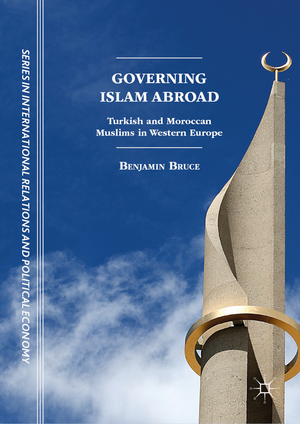Governing Islam Abroad: Turkish and Moroccan Muslims in Western Europe: The Sciences Po Series in International Relations and Political Economy
Autor Benjamin Bruceen Limba Engleză Hardback – 6 sep 2018
| Toate formatele și edițiile | Preț | Express |
|---|---|---|
| Paperback (1) | 582.80 lei 6-8 săpt. | |
| Springer International Publishing – 26 dec 2018 | 582.80 lei 6-8 săpt. | |
| Hardback (1) | 593.08 lei 6-8 săpt. | |
| Springer International Publishing – 6 sep 2018 | 593.08 lei 6-8 săpt. |
Din seria The Sciences Po Series in International Relations and Political Economy
-
 Preț: 318.85 lei
Preț: 318.85 lei -
 Preț: 303.28 lei
Preț: 303.28 lei -
 Preț: 163.50 lei
Preț: 163.50 lei -
 Preț: 307.88 lei
Preț: 307.88 lei -
 Preț: 385.84 lei
Preț: 385.84 lei -
 Preț: 385.47 lei
Preț: 385.47 lei - 18%
 Preț: 733.33 lei
Preț: 733.33 lei -
 Preț: 389.49 lei
Preț: 389.49 lei -
 Preț: 416.71 lei
Preț: 416.71 lei -
 Preț: 388.13 lei
Preț: 388.13 lei -
 Preț: 384.86 lei
Preț: 384.86 lei - 18%
 Preț: 892.74 lei
Preț: 892.74 lei - 15%
 Preț: 646.94 lei
Preț: 646.94 lei -
 Preț: 418.07 lei
Preț: 418.07 lei -
 Preț: 390.63 lei
Preț: 390.63 lei - 15%
 Preț: 584.58 lei
Preț: 584.58 lei -
 Preț: 391.79 lei
Preț: 391.79 lei -
 Preț: 383.12 lei
Preț: 383.12 lei -
 Preț: 390.63 lei
Preț: 390.63 lei -
 Preț: 387.96 lei
Preț: 387.96 lei -
 Preț: 387.75 lei
Preț: 387.75 lei -
 Preț: 385.84 lei
Preț: 385.84 lei -
 Preț: 387.75 lei
Preț: 387.75 lei -
 Preț: 383.50 lei
Preț: 383.50 lei -
 Preț: 389.88 lei
Preț: 389.88 lei - 18%
 Preț: 1113.58 lei
Preț: 1113.58 lei -
 Preț: 396.40 lei
Preț: 396.40 lei -
 Preț: 387.38 lei
Preț: 387.38 lei -
 Preț: 385.84 lei
Preț: 385.84 lei -
 Preț: 389.70 lei
Preț: 389.70 lei
Preț: 593.08 lei
Preț vechi: 697.75 lei
-15% Nou
Puncte Express: 890
Preț estimativ în valută:
113.51€ • 118.06$ • 95.13£
113.51€ • 118.06$ • 95.13£
Carte tipărită la comandă
Livrare economică 13-27 martie
Preluare comenzi: 021 569.72.76
Specificații
ISBN-13: 9783319786636
ISBN-10: 3319786636
Pagini: 303
Ilustrații: XVII, 303 p. 8 illus., 7 illus. in color.
Dimensiuni: 148 x 210 x 27 mm
Greutate: 0.67 kg
Ediția:1st ed. 2019
Editura: Springer International Publishing
Colecția Palgrave Macmillan
Seria The Sciences Po Series in International Relations and Political Economy
Locul publicării:Cham, Switzerland
ISBN-10: 3319786636
Pagini: 303
Ilustrații: XVII, 303 p. 8 illus., 7 illus. in color.
Dimensiuni: 148 x 210 x 27 mm
Greutate: 0.67 kg
Ediția:1st ed. 2019
Editura: Springer International Publishing
Colecția Palgrave Macmillan
Seria The Sciences Po Series in International Relations and Political Economy
Locul publicării:Cham, Switzerland
Cuprins
1. Introduction.- 2. The Many Faces of Official Islam in Turkey.- 3. The Makhzen and the Religious Field.- 4. The Development of State Religious Services Abroad.- 5. Creating a National Islam? Partial Governance and Public Policy Instruments.- 6. Exporting Imams.- 7. National Interests in Transnational Muslim Fields.- 8. Conclusion.
Notă biografică
Benjamin Bruce is Research Fellow with the Mexican National Council of Science and Technology (Conacyt) at El Colegio de la Frontera Norte (El Colef), Mexico.
Textul de pe ultima copertă
From sending imams abroad to financing mosques and Islamic associations, home states play a key role in governing Islam in Western Europe. Drawing on over one hundred interviews and years of fieldwork, this book employs a comparative perspective that analyzes the foreign religious activities of the two home states with the largest diaspora populations in Europe: Turkey and Morocco. The research shows how these states use religion to promote ties with their citizens and their descendants abroad while also seeking to maintain control over the forms of Islam that develop within the diaspora. The author identifies and explains the internal and foreign political interests that have motivated state actors on both sides of the Mediterranean, ultimately arguing that interstate cooperation in religious affairs has and will continue to have a structural influence on the evolution of Islam in Western Europe.
Benjamin Bruce is Research Fellow with the Mexican National Council of Science and Technology (Conacyt) at El Colegio de la Frontera Norte (El Colef), Mexico.
Caracteristici
Concentrates on the similar capacity of Turkey and Morocco to intervene in religious affairs as a domain of public policy Addresses the question of “Islam in the West” from the perspective of the home states Offers a comparative study of home states' transnational politics and foreign policy interests backed up by an understanding of the relevant historical and political contexts
